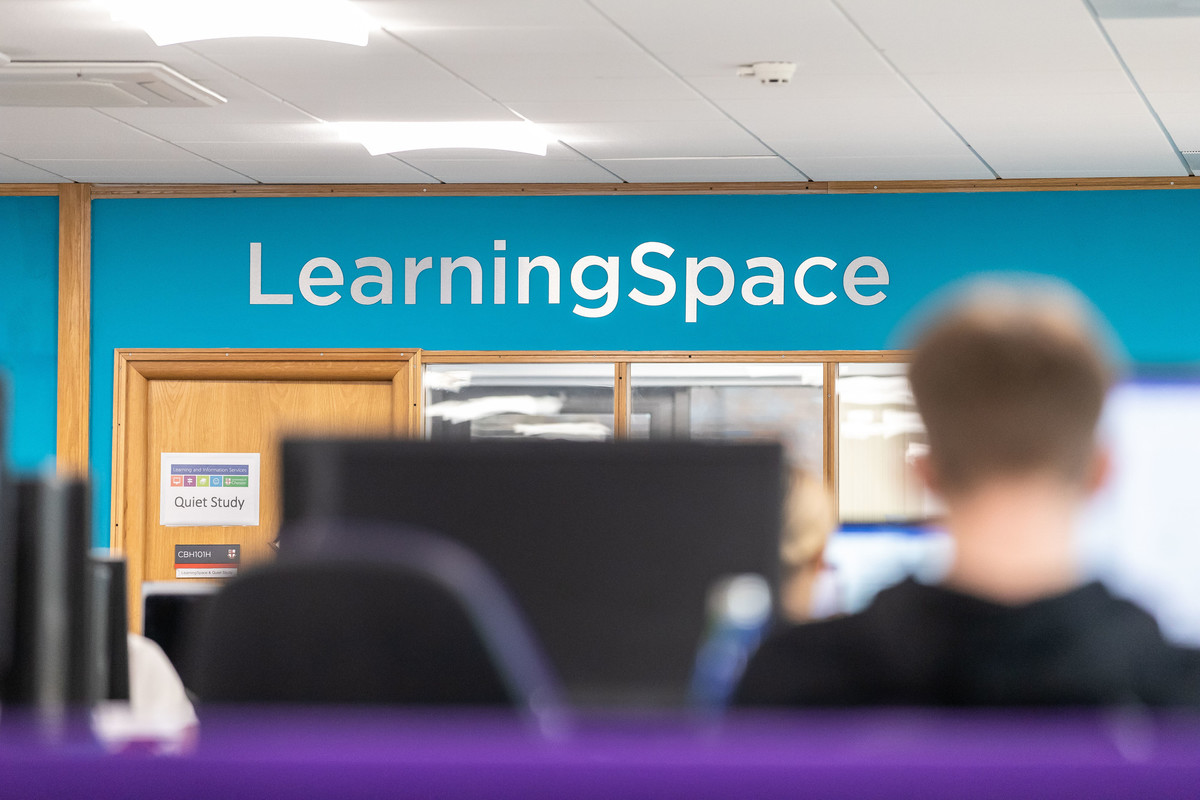International Business Management BA (Hons)


Available with:
- A Foundation Year
- A Placement Year
Accreditations

You are viewing Course summary
Course Summary
Prepare to be a future leader in an increasingly global business environment by gaining the knowledge, skills and perspective you need to succeed in management. This course provides the toolkit to work for a company in the international market, discover how organisations operate on the world stage, and gain real-life work experience throughout your studies. You will learn from industry speakers, global examples, business simulations, and will develop the skills that employers are seeking.
As part of the course you will be offered an international field trip to experience a foreign cultural and business environment.
Your transformation into a future business professional begins from day one. In your first year you will gain an understanding of the business environment and develop fundamental management skills in marketing, people, organisations, and finances. In year two, you will translate this management knowledge to the wider world and gain a solid understanding of the challenging international business environment. Aspects such as globalisation, cultural variation and the challenges of different geographical, political and economic factors are addressed. Your final year is tailored towards giving you the competitive edge you need to enter your chosen career in business. You will carry out an original supervised research project.
What you learn will be anchored to today’s international business world, blending the study of top global companies with that of emerging sectors such as artificial intelligence and financial innovation. If you’d like to know more about what Chester Business School are up to, you can follow us on Facebook, X/Twitter, Instagram and LinkedIn.
What you'll Study
Module content:
- Reading and writing critically.
- Constructing and evaluating an argument.
- Note-taking techniques for reading and listening.
- Understanding plagiarism and academic integrity.
- Introduction to reflective practice.
- Preparing for, and delivering, powerpoint presentations.
- Referencing and citation.
- Summarising and paraphrasing written sources.
- Literature searching.
- Report writing.
- The culture and expectations of higher education.
- The assessment process including the role of assessment criteria and feedback.
- The nature of research journal publishing.
Whilst much of the content above is generic, students will be encouraged to situate skills within the context of the undergraduate discipline they are entering, which leads to some variation in emphasis for certain skills.
Module aims:
1.To raise awareness of the range of study skills required for successful higher education studies, including the process of academic writing, reading strategies, seminar skills, organisation of time and materials, planning for and meeting deadlines, understanding and responding to feedback.
2. To introduce students to concepts such as plagiarism, academic integrity and appropriate use of artificial intelligence tools.
3. To facilitate an effective transition into higher education by exploring, and providing guidance in, the key elements of successful undergraduate studentship including students' understanding of taking responsibility for their own learning.
4. To teach students how to undertake a literature, visual or data review for their discipline and be able to differentiate between a valid, reliable source and an unsubstantiated or irrelevant source.
Module content:
- Research and planning skills.
- Becoming familiar with topics that comprise their undergraduate degree subject.
- Developing a knowledge base for a discipline of study.
- Identifying areas of interest.
- Application and development of critical analytical skills.
- Development of self-directed study.
- Use of learning resources.
Module aims:
1. To develop students' skills in planning and writing an essay.
2. To familiarise students with the process of tutor supervision for a written piece of work.
3. To give students an opportunity to focus on a topic within their undergraduate degree subject.
4. To write a piece of work that allows the student to broaden and deepen knowledge on a topic of their choice.
5. To prepare and deliver an academic poster presentation outlining the student's research topic.
Module content:
- The 'global student' and the ‘global graduate’
- Introduction to theories of globalization
- Perspectives on economic, political and cultural globalization
- Globalized media, the internet & digital tech.
- Global economy & transnational corporations
- International organisations & social movements
- Migration, multiculturalism and interculturalism
- Introduction to decolonisation & education
- International security and security issues
- Introduction to international relations theory
Module aims:
1. To explore issues of global significance.
2. To develop and apply skills in critical thinking, research and communication and apply these to debates within the module's topics.
3. To deconstruct and reconstruct arguments by researching global issues.
4. To develop an awareness of global justice debates.
Module content:
- Introduction to Marketing Strategies
- Understanding the Marketing Mix (product, price, place and promotion)
- Influences on Target Market & Segmentation
- Marketing events
Module aims:
- To introduce students to a range of Marketing concepts & principles.
- To develop students' understanding of the Marketing Mix in the modern world of business.
- To provide a foundation-level knowledge base of business marketing
Module content:
- Introduction to business functions (including human resources management, operations, marketing & finance)
- Examples of leadership and management
- Corporate social responsibility
- Understanding organisational structures and behaviour
- Introduction to strategy
- Influences on business (including contract law & the formation of contracts)
- Introduction to entrepreneurship
Module aims:
- To introduce students to a range of business functions.
- To develop students' understanding of operational and strategic practices in the modern world of business.
- To provide a foundation-level knowledge base of business and entrepreneurship.
Module content:
- Preparation of Financial Statements (including trading profit and loss statement)
- Presenting graphical information
- Data handling
- Percentages, ratios and proportions
- Analysing business performance
- Procedures & legal requirements
Module aims:
1. To provide a foundation-level knowledge of mathematics in preparation for progression to an undergraduate degree in Business.
2. To introduce students to fundamental concepts within maths using a selection of applications relevant to Business.
3. To introduce foundation-level knowledge in mathematical applications for finance.
In Year 1, you will study a broad range of subjects to gain an overview of the functional disciplines of international business.
Module content:
The module explores a number of key themes to introduce students to the concepts of people management and organisations and supports students to develop core skills for managing people and working in teams.
- The development of management and organisations as subjects - changing theories of management and leadership perspectives
- People in organisations – indicative content: motivation, culture, personality, identity, how people work in groups and effective teamworking, learning in an organisational context
- Managing people in organisations - indicative content: organisation and job design, talent management, goal setting, communication, perception and the psychological contract, job satisfaction, stress
- Skills for managing people in teams and organisations - indicative content: team formation, team working and leading, managing performance, giving feedback, managing conflict
Module aims:
- To enable students to examine a range of management themes and activities
- To introduce students to theory underpinning organisational behaviour
- To enable students to consider the significance of different environmental contexts in which organisations operate, and the effects of the environment on its activities
- To enable students to develop transferable skills for managing people in teams and organisations
Module content:
- Preparation of simple financial statements – statement of financial position/income statement. Adjustments-depreciation/sources of finance/accounting conventions and standards.
- Analysis and interpretation of financial statements – profitability, liquidity, working capital, gearing and investment ratios. Cash flow statement.
- Budgets/cash flow forecast/forecast profit or loss/profit vs. cash.
- Product/service costing/absorption costing/overhead allocation, apportionment and absorption.
- Cost-volume profit analysis, cost behaviour, break-even analysis, simple contribution analysis.
Module aims:
- To equip students with a basic grasp of the underlying principles and concepts of finance and accounting and to be familiar with the relative uses of both financial and management accounting practices.
- To develop the student’s ability to read and interpret simple financial statements.
- To introduce students to the process of using and presenting structured financial data to assist the management decision making process.
Module content:
|
Indicative content:
|
Module aims:
The aims of this module are to enable students to:
- Understand and apply the concepts of entrepreneurship and intrapreneurship, and the opportunities and challenges they present to the individual
- Explore and actively manage their own development as entrepreneurs/intrapreneurs
- Develop proficiency in the application of tools and techniques to create and communicate entrepreneurial and intrapreneurial opportunities
Module content:
Some of the concepts and areas of study and skill development that may be covered include:
- The internal and external environment in which international businesses operate;
- The challenges posed by the global business environment;
- Business economics, demand and supply and market efficiency and failure;
- Financial markets and money;
- The management of national economy;
- The role of governments;
- The role of international organisations;
- Economic systems;
- Corporate Social Responsibility;
- Ethics;
- Cultural factors.
n.b. the above list is indicative only and may be varied at any time.
Module aims:
The main aim of the module is to enhance students’ knowledge and understanding of the global business environment and its impact on the performance and competitiveness of international businesses.
Module content:
- The role of marketing within organisations and society.
- The development of marketing and marketing concepts.
- Introducing the Marketing Environment.
- An introduction to Marketing research.
- Introducing consumer behaviour.
- Understanding segmentation, targeting and positioning.
- The Marketing Mix
- Marketing in context - this may focus on various contexts (e.g Public Sector, Non-profit Organisations, Marketing Events, Destination Marketing & Sports Marketing).
- Introducing international marketing
Module aims:
- To provide students with fundamental knowledge of concepts, principles and theories of marketing.
- To introduce students to marketing techniques and applications.
- To develop the students' understanding of the linkages between concepts and contexts.
- To enable students to relate these principles to a range of organisational contexts.
Module content:
This module will use a series of workshops to explore key themes associated with academic and professional development. Students will engage in self-reflection and analysis in order to develop a personal action plan, to be implemented throughout the year. Study and professional skills will dominate the curriculum, offering students rich opportunities to develop.
The topics will include, but are not limited to:
- Academic integrity including academic writing, referencing and responding to feedback
- Research skills - locating, evaluating and using good quality research information.
- Emotional intelligence and self-awareness: your skills, strengths and weaknesses, personality and needs.
- Learning styles and approaches
- Idea generation and problem solving
- Developing effective teams: team dynamics, negotiation and conflict resolution
- Commercial and subject/discipline awareness; understanding the academic and environmental contexts
- Personal management; planning and time management, avoiding stress and tackling assignments/exams
- Managing your professional image; CVs, social media profiles, portfolios
- Personal and professional development planning
- Career awareness and action planning
Module aims:
This module aims to support students in their transition into Higher Education by introducing and developing their understanding of;
- Higher Education expectations including academic research, writing, structure and UoC processes
- Independent learning including curriculum engagement, time management and understanding and using feedback
In addition, the module aims to improve the employability of students by providing opportunities for them to;
- Develop and evidence a range of transferable skills such as teamworking, presentation skills, researching, working to deadlines and problem solving
- Explore and enhance self-awareness through skills auditing, peer/academic reviews and personal and professional action planning
- Identify the qualifications, skills and qualities required to enable them to progress into their chosen career path and articulate any current gaps
During Year 2, you will explore the functional areas of business and the contemporary international context in which they operate. You may also undertake a placement.
Module content:
The traditional academic programme structure is not applicable in relation to this experiential learning intern-ship opportunity. The experiential content is freely structured and determined by negotiation between the student, placement supervisor and host organisation. It is generally informed by the aims and learning outcomes and by the objective of optimising added value for both the host organisation and the student experience.
A placement conference will enable peer to peer sharing of experiential learning permit feedback and allow an analysis of the range of skills and benefits derived from the placement, it will also further develop the construction of learning logs and the portfolio. For those unable to attend, for whatever reason, online via Teams will permit engagement and feedback. In addition, the conference will provide an opportunity to acquire an overview of final year options and dissertation and/or project research.
For those students where costs or other geographical/logistical difficulties render visits, conference attendance or participation via teleconferencing prohibitive, there will be an augmented portfolio of activities to substitute the conference activities.
All students will engage in the drawing up of a learning agreement on acceptance of the placement that will cover a contact plan and agreed learning outcomes with their designated academic tutor and placement coordinator.
Module aims:
- To provide an opportunity for students to apply and enrich their previous theoretical knowledge and understanding of course content through observation in and insights derived from working in an organisation and professional environment.
- To enable students to develop their practical and transferable skills in a business environment and to experience a broad range of tasks and responsibilities in different functional areas.
- To enable students to pursue professional and personal development in a working business environment
- To enable students to recognise the nature of tasks, workloads, management problems and working methods in the working environment.
- To enable students to inform the tasks, problems and scenarios presented in the business environment with theoretical concerns emanating from their studies and research and vice versa.
Module content:
Indicative Content
- Understanding People Management: role and function
- Introduction to Human Resource Management
- The key objectives of the HR function
- Strategic HRM: Achieving the business strategy through HRM
- Managing and coordinating the Human Resource Function
- Employee engagement and the psychological contract
- Resourcing strategy, workforce planning, defining jobs, recruitment and selection, attraction and retention strategies
- Managing the employee relationship including employee contracts.
- Managing performance; The Performance management journey, from entry to exit including, developing the reward
- Strategy induction, performance review, learning and development, the role of the line manager and managing people through change. Managing performance including capability, absence, dismissal, redundancy, retirement.
- Evaluating People Management: Measuring HRM's contribution to organisational success; Measuring human capital, corporate social responsibility and employee wellbeing
Module aims:
- To enable students to uphold and maintain the standards and behaviours set out in the CIPD code of professional conduct (2023).
- To develop within students a body of knowledge and understanding relevant to the successful management of people in the workplace.
- To enable students to recognise and carry out the key activities of the HRM function.
- To enable students to evaluate and where necessary, formulate improvements pertaining to the techniques used in managing people in the workplace.
Module content:
- Introduction to purpose of research
- The research process
- Market research industry, research briefs and proposals
- Research ethics and code of conduct
- Qualitative and quantitative research
- Primary and secondary research
- Research in context: design and methodologies
- Sampling methods
- Data analysis: Intro to SPSS
- Interpretation of data
- Contemporary issues for research in practice
Module aims:
The aim of the module is to provide the student with the knowledge, understanding and skills foundation to the level 6 management research project. This module covers the scoping of a research problem, design of appropriate data collection methods, data analysis and data interpretation in order to develop business-relevant recommendations. Whilst this module will provide practical experience of data collection, it will not assess data collection. The aims are as follows:
- To understand the reasons that research is undertaken in varying contexts
- To provide adequate preparation for scoping a management research project at level 6
- To develop knowledge and understanding of the research process, data collection, data analysis and data interpretation
- To create practical experience of research design and execution
Module content:
Some of the concepts and areas of study and skill development that may be covered include:
- Planning for International Business
- Effective business management
- Managing across cultures
- Leadership and Management
- The international political economy
- Developing international strategy
- International cooperation and collaboration
- Responsible Corporate Behaviour; The role of ethical and social responsibility in international business
- Organisational development and behaviour
- Managing Change
- Managing Information and Technological Resources
n.b. the above list is indicative only and may be varied at any time.
Module aims:
Building on previous study at level 4, this module will continue to develop students' knowledge and understanding of organisations and the international business environment. This module will introduce students to the key issues in leading and managing businesses with particular focus on the international dimension.
The aim of the module is to equip students with the range of knowledge required by managers to contribute to leading organisations in the global business environment.
Module content:
Indicative content:
- Types of decisions and decision making processes
- The dynamics of decision making at individual, group and organisational levels (including the impact of psychology, leadership styles, power and politics)
- Data, information and knowledge management
- Skill development: Constructing and communicating persuasive arguments
- Skill development: Effective business reports
- Project management
- Risk and uncertainty
- Ethics in decision making
- Communicating decisions
- In-depth exploration of operations management and underpinning concepts e.g. the volume/ variety mix and its implications for product/ process design, process layout, use of technology, operations planning and control.
- Strategic decision-making and operations management - levels of strategic contribution; the challenges of market evolution for operations
- Comparative study of the management challenges of manufacturing and service operations
Module aims:
To develop students' ability to:
- assess the key influences on effective and ethical decision making
- analyse an organisation according to its operational capabilities
- apply management tools and techniques in operational planning, monitoring and control
Module content:
- Decomposing costs for decision making
- Traditional costing – its dangers as a decision tool
- How Activity Based Costing improves decision-making
- Short term decision making
- Cost-volume-profit analysis
- Marginal costing – for planning, pricing and decision-making
- Relevant costing – for decision making
- Using budgets for planning and control through variance analysis
- Long term decision making – making capital investment decisions - introducing cost of capital
- Pricing to achieve the organisation's objectives - cost plus pricing, target costing
- Monitoring and measuring performance – e.g the balanced scorecard
- Working Capital Management
- Excel model development for decision making.
Module aims:
- To enable students to elaborate on key management accounting themes and concepts introduced at Level 4 or equivalent
- To introduce students to management accounting techniques used for decision making.
- To enable students to develop analytical and problem-solving skills through the application of management accounting tools to theoretical situations - sometimes incorporating Excel models
Module content:
Indicative content:
- This module provides an examination of entrepreneurial thought and action by making provision for all students to initiate and develop a new student venture.
- Researching and building on theories and definitions of entrepreneurial thought and action
- An examination of one's potential to develop entrepreneurial skills and abilities
- An exploration of creativity and innovation in a business setting
- A study of entreprenurial communication and effective negotiation practises
- Identify the key steps to converting ideas into potential business opportunities
- An examination of the key steps in undertaking risk and environmental analysis
- Identify and examine the legal, ethical and social challenges associated with entrepreneurial activity
- Examine the key challenges of sustainability with a consideration of business failure
- Research the impact of social media and technology on new ventures
- Undertake research and activities related to employability enhancement
- Develop an understanding of the impact of entrepreneurial teams
Module aims:
- To equip students with a critical knowledge and understanding of what entrepreneurship is and its economic importance
- To develop in students practical skills related to communicating, negotiating and selling ideas
- To explore and investigate current issues and challenges impacting on the start-up and management of new ventures
- To immerse students in a number of pragmatic activities that will provide opportunities to develop, refine, reflect and articulate core employability and entrepreneurial skills.
Module content:
Some of the concepts and areas of study and skill development that may be covered include:
- Globalisation: Contrasting definitions and perspectives;
- The internationalisation and integration of trade, product and factor markets and their regulation.
- The economic growth, welfare, benefits distribution and sustainibility debate;
- Locational theories: The international distribution of the value chain, Offshoring and international outsourcing;
- The significance to international business of cross-cultural issues, business networks and the international distribution of the value chain.
n.b. the above list is indicative only and may be varied at any time.
Module aims:
This module investigates the real world context in which international businesses have to operate. It analyses the economic and political systems of globalisation that have evolved in the last thirty years and the different perspectives that have led to the interdisciplinary debate on whether the extension of liberalised trade and capital movements and the increasing international integration of markets has been welfare enhancing.
It also examines the business rationale for the applied mechanisms adopted by international companies to exploit business opportunities and deal with threats, and the role of competitive drivers in these processes. This links with the students fuller exploration of these mechanisms in BU5303: International Business Operations.
Major aims of the module are:
To enable the student to expand their knowledge and understanding of the business world and to create an interest for lifelong learning in this key area.
To expand the student's awareness that in place of universal consensus as to causes and outcomes, with many contemporary issues, knowledge and understanding need instead to be informed by a careful weighing of evidence.
Module content:
Part A:
Preparation for Experiential Overseas Learning will take place at the university of Chester during level 5 and will include:
- The multiple facets of Global citizenship
- Ethical engagement and practice
- Cross-cultural issues and sensitivity
- Intercultural communication
Theories, models and strategies of learning
- Theories and models Intercultural competence
- Theories and models of Integration and Multiculturalism
- Critical thinking skills and models of Reflection
- Experiential learning models
- Self-directed experiential learning
Personal and placement-related skills
- Enhanced independence
- Improved command of multicultural behaviour
- Increased knowledge and confidence in their individual facets of personal identity
- Effective time management and organisational skills
- Project management – working away from University and independent study
- Self-management and personal development
- Team building and team work
Part B: Overseas
Students will engage in experiential learning activities overseas for at least 150 hours
Module aims:
The purpose of this module is to enhance students’ prospects of completing an overseas placement to the best of their ability consequently it aims to:
- To equip participants with appropriate knowledge and skills to study or work in a different cultural, linguistic and/or social environment; enhancing ethical, cultural and intercultural awareness.
- To enhance students understanding of the ethical issues related to living and working abroad.
- To increase students Global Citizenship skills
- To provide an opportunity for students to reflect critically on their experience of living and learning within an unfamiliar culture, to their 'home' culture or ethnic group.
To challenge students to learn about themselves as global citizens in terms of life skills, career choices and academic development outside the classroom.
Module content:
Preparation for the year abroad will take place in Chester during level 5 and will include:
- Cross-cultural issues and sensitivity
- Host-country orientation, study methods– economic, political and social reality of the country
- Orientation specific to exchange – health, education, gender issues
- The United Nations Sustainable Development Goals
- Practical matters relating to living and studying in the wider world
Theories, models and strategies of learning
- Critical thinking skills, experiential learning and models of reflection
Personal and placement-related transversal skills
- Effective self-motivation and independent resourcefulness
- Effective time management and organisational skills
- Project management – working away from University and independent study
- Self-management and personal development
Whilst abroad:
Students will undertake study at one of UoC’s partner universities; it is expected that students will choose a series of modules at the university abroad, which equal a full-time study load. This must be agreed by the host institution and the International Tutor. Students must supply details of their courses/modules on a learning agreement within 4 weeks of arrival at the host university, note students who fail to supply this within 4 weeks may have the opportunity withdrawn.
Module aims:
- To experience academic life in country outside of the EU, enhancing cultural and intercultural awareness and increasing transversal skills.
- To reflect on the impact of the experience in their destination on one’s own personal, academic and professional development.
- To engage with the experience of study at a partner university to gain extensive first-hand knowledge and understanding of the relevant society from the perspective of the resident.
- To further develop independent learning techniques.
- To foster critical evaluation.
Module content:
- The multiple facets of global citizenship
- Ethical engagement and practice
- The United Nations Sustainable Development Goals
- Cross-cultural issues and sensitivity
- Intercultural communication
- Culture shock
- Cultural adjustment
- Self- assessment of needs: identification of the range of transferable skills, competencies and attitudes employees need and employers expect graduates to possess-with a strong focus on understanding the intercultural competencies (ICC) needed to live and work abroad.
- Critical analysis/evaluation of individual requirements in relation to culture/cultural adjustment/culture shock/visas/medical.
- Critical analysis/evaluation of skills already acquired in relation to key skills related to ICC.
- Devising strategies to improve one’s own prospects of working abroad in the future.
- Devising an action plan to address gaps in transferable skills based on organisational analysis and sector opportunities.
Module aims:
This module promotes a reflective and critical approach to interculturality and aims to enhance students’ prospects of gaining overseas graduate employment, which will enable them to:
- Examine and evaluate a chosen aspect of the society of a target country
- Enhance cultural and intercultural awareness and further develop related skills.
- Articulate clearly their career plans and take steps to prepare for their first paid overseas graduate role,
- Take responsibility for their own learning and acquisition of identified employability skills,
- Articulate, orally and in writing, their findings and their employability skills.
Module content:
The module will engage students through the use of lectures and seminar discussions. These will explore key themes and topics so that students may develop and enhance their knowledge, comprehension, analysis and application of marketing concepts, tools and theories within domestic and international contexts. This aims to support the preparation of the student in a marketing manager role.
These themes and topics may include, but are not limited to:
- Purpose and role of marketing management and planning within the context of domestic and international markets.
- Secondary data sources for marketing planning.
- The components of an internal and external situation analysis
- Analysis and application of segmentation, targeting and positioning.
- Planning market entry method in domestic and/or international markets.
- Approaches to managing innovation.
- Managing product portfolios.
- Managing distribution systems for value
- Setting and managing pricing strategies
- Integrated marketing communications for competitive advantage and brand value.
- Application and evaluation of the adaptation standardisation approaches to marketing across markets.
Module aims:
The aims of this module are to:
- To analyse and understand the importance of the situation analysis and apply appropriate models to an organisation’s situation.
- To investigate the different contexts (domestic and international) in which organisations manage their marketing activities.
- To examine the significance of coordinating and managing marketing for competitive advantage.
- To provide an insight into the approaches of managing innovation.
- To integrate and enhance areas of marketing knowledge and comprehension building on knowledge from other modules.
Module content:
Pre-placement:
- Structured approaches to researching, selecting and securing a suitable work placement relevant to the student’s interests and career aspirations*.
- Writing an effective CV. Constructing a letter of application.*
- Interview skills.*
*Note: Students are required to undertake these pre-placement tasks during term 1 level 5, as part of the placement acquisition process and will be supported by the Work Based Learning team and the Careers and Employability department.
Induction Programme and Placement:
- The organisational context: research-informed analysis of the placement organisation’s aims, structure, culture.
- Self- assessment of needs: identification of the range of transferable skills, competencies and attitudes employees need and employers expect graduates to possess. (Employability Skills: e.g. verbal and written communication, analytical / problem solving capabilities; self-management; team working behaviours; negotiation skills; influencing people; positive attitude, resilience, building rapport).
- Devising a strategy for integrating into the workplace and work based teams
- Completion of online assignment tasks covering sourcing and obtaining placement; health and safety procedures in general; general workplace integrity; placement requirements.
During and post-placement: Learning effectively in and from the workplace:-
- Devising and implementing strategies to improve own approach and performance
- Critical analysis/evaluation of approach to skill development and performance in the workplace;
- Influencing the Placement Provider’s appraisal;
- Devising an action plan to develop gaps in transferable skills based on the placement experiences;
Module aims:
This module aims to enhance students’ prospects of gaining graduate level employment through engagement with a University approved work placement**, which will enable them to:
- Develop their understanding of workplace practice and lifelong learning;
- Enhance their work readiness and employability prospects through development of transferable skills;
- Take responsibility for their own learning and acquisition of workplace employability skills;
- Articulate, in writing, their employability skills.
Module content:
- The organisational context: research-informed analysis of the sector’s role, development opportunities or career paths.
- Self- assessment of needs: identification of the range of transferable skills, competencies and attitudes employees need and employers expect graduates to possess. (Employability Skills: e.g. verbal and written communication, analytical / problem solving capabilities; self-management; team working behaviours; negotiation skills; influencing people; developing a positive work attitude, resilience, building rapport with co-workers).
- Devising strategies to improve one’s own career.
- Critical analysis/evaluation of skills already acquired.
- Devising an action plan to address gaps in transferable skills based on organisational analysis and sector opportunities.
Module aims:
This module aims to enhance students’ prospects of gaining graduate level employment, which will enable them to:-
- Enhance their work readiness and employability prospects through identifying relevant transferable skills for their chosen career path,
- Clearly articulate their career plans and take steps to prepare for their first graduate role,
- Take responsibility for their own learning and acquisition of workplace employability skills,
- Articulate, in writing, their employability skills.
Year 3 will enable you to specialise in aspects of business theory and international management practice and undertake a research project or dissertation of your choice.
Module content:
This module is delivered in the context of the modern business environment, therefore, contemporary case studies and reports on companies and industries are integral to learning on the module.
Topics include:
- The macro, industry and market environments,
- The internationalisation process,
- Strategic mergers, acquisitions and alliances,
- Innovation and knowledge management,
- Writing and delivering strategy,
- Undertaking analysis on organisations and their strategic successes/failures.
Module aims:
As well as the subject knowledge and understanding set out in the module content, this module is designed to bring together and build on prior levels 4 and 5 knowledge, and current learning in the functional areas of business and/or tourism and events management (or suitable equivalent).
The seminars and assessments, both formative and summative, are designed to enhance the students' abilities in critical evaluation of sources and academic texts. The module is designed to enhance critical faculties in balanced judgements within a context of imperfect information, risk and uncertainty, using both deductive logic and inductive lateral thinking while recognising the constraints of both.
Module content:
-
Retailing formats and channels
-
Retail management concepts
-
Retailing destinations and environment
-
Retail strategy and planning
-
Management of the Retail Marketing Mix
-
The competitive environment
-
Understanding the retail consumer
-
Emerging customer expectations and shopping behaviour
-
Transformation of retail and retail change theory
-
Online / Delivered retail services and reverse logistics
-
Innovation and technology in retail
-
Retail ethics and Corporate Social Responsibility
Module aims:
The aim of this module is to introduce students to the nature and organisation of the retail sector and the principles of retail management.
We shall explore contemporary topics such as the changing nature of retail practice and consumer behaviour as digital technology and customer preferences in general continue to evolve.
Students will examine the strategic and tactical application of key retail management concepts in a variety of retail formats and contexts, and evaluate the effectiveness of key retail methods and applications.
The implementation and evaluation of retail management approaches will be explored with reference to real-world practical case studies and examples, including input from retail specialists as guest speakers.
A key underpinning of the module is the application and management of general and retail-oriented marketing concepts in a retail-specific environment.
Module content:
Students will be expected to have studied some finance and accounting prior to undertaking this module (for example, module BU4002, BU5016 or equivalent).
- Financial management function – the nature and purpose of financial management / financial objectives and the relationship with corporate strategy / stakeholders and impact on corporate objectives organisational objectives including in not-for-profit organisations
- Financial management environment – the economic environment for business / nature and role of financial markets, institutions and money markets
- Working capital management – the nature, elements and importance of working capital / management of inventories, accounts receivable, accounts payable and cash / determining working capital needs and funding strategies
- Investment appraisal - investment appraisal techniques / allowing for inflation and taxation in investment appraisal / adjusting for risk and uncertainty in investment appraisal / specific investment decisions (lease or buy decision / asset replacement / capital rationing)
- Business finance - sources of, and raising business finance / estimating the cost of capital, including WACC / sources of finance and their relative costs / capital structure theories and practical considerations / finance for small and medium-sized entities (SMEs)
- Business valuations - nature and purpose of the valuation of business and financial assets / models for the valuation of shares / the valuation of debt and other financial assets / Efficient Market Hypothesis (EMH) and practical considerations in the valuation of shares
Module aims:
The purpose of this module is to :
- identify the principal concepts in the theory and practice of financial management and corporate finance
- develop the knowledge and skills expected of a finance manager, in relation to investment, financing, and dividend policy decisions
- analyse and evaluate financial strategies through the application of appropriate tools in relation to management needs and policies
- synthesise argument and consolidate knowledge by the presentation of strategic financial decisions, in a coherent format, suitable for relevant users
Module content:
Indicative Content:
- Leadership versus Management
- Theories/Approaches to Leadership (eg Trait, Situational, Contingency, Transformational)
- Leadership dilemmas: conflict management, power, influence and trust
- Responsible and ethical leadership
- Leadership and management development
- Group leadership
- Leading in the 21st Century (e.g. cross-cultural contexts, communication technology)
- Nature and process of change
- Planned versus emergent change
- Impact of technology on change (eg BPR)
- Resistance to change
- Managing change
- Approaches for leading and embedding change
- Leadership and change management skills (eg EI, project and event management)
Module aims:
The module focusses on the nature and significance of leadership in organisations, evaluating contemporary and future contexts in the light of developments in theoretical approaches to leadership and change , providing critical insight into the challenges inherent in successfully leading change and the role of the future leader in doing so.
Module content:
- Introduction to the research process
- The importance of research justification and scoping
- Methodological foundations of research
- Moral and ethical issues in research
- Effective project management
- Rigour and feasibility issues in research
- Quantitative methodology: Research design, data collection and analysis
- Qualitative methodology: Research design, data collection and analysis
- Writing and reporting research in context
Module aims:
The Management Research Project aims to draw together specific subject knowledge and skills, with a particular focus on improved self-awareness and preparation for business, by challenging students for personal and academic development to management positions and and to employability on general.
- To undertake a research project that is 'scoped and framed' within a required degree programme of study.
- To enable the student to design and conduct appropriate in-depth research in an elected area of study.
- To provide the student with the opportunity to acquire, consolidate and apply theoretical knowledge, methodologies, and research approaches in a ‘real world’ environment.
- To enable the student to develop and utilise skills in critical investigation; analysis and synthesis of evidence; reflection and autonomous learning.
Module content:
Some of the concepts and areas of study and skill development that may be covered include:
- Managing in a global environment
- Economics and decision making
- Cross cultural management
- Corporate Social Responsibility
- Political and regulatory environment
- Multinational innovation and information technology
- Environmental factors
- Structuring international business
- International management process and organisation
- Global talent management
- Managing international business risk
- Legal issues and ethics
- Global governance
- Contemporary issues in international business
n.b. the above list is indicative only and may be varied at any time.
Module aims:
To combine the knowledge and learning from all level 4, 5 and 6 international business management modules and apply this to a practical business context. To further develop international business and management skills including knowledge, research, analysis, presentation of information and findings and communication skills
The module aims focus on enabling students to review practical business problems and propose solutions to these problems. It will enable students to apply their knowledge and developed expertise to the evaluation and analysis of business problems and to solve case study examples and specific case problems. Students will justify the solutions which they have proposed utilising an examples and case study reference points taken from and referring to a variety of business sectors. The module encourages and supports the enhanced development of decision making skills while ensuring that developing the viability of student capability and responses becomes a key element of the students skill sets.
It is the aim of the module that students will develop various skills valued by organisations such as commercial awareness, communication and effective teamwork and problem analysis and solving.
Module content:
Indicative Content
To develop an understanding the employment relationship and the nature of work
To understand the role of the line manager in the performance management process (coaching, counselling and mentoring; performance review, feedback and managing continuous personal development; managing under-performance and performance improvement plans; monitoring and mentoring of line managers in the performance management process to ensure equity)
To identify and evaluate a range of people management practices and how to design them in an integrated and ethical way to ensure professional principals, regulation and law are evidenced when making decisions about performance
To be able to develop an understanding of the people performance function: creating a learning culture that supports continuing professional development and high performance working (HPW), current and future trends in adult learning and motivation into the organisation’s learning approach, design learning using theories and methods that maximise learner engagement, reward, learning transfer and impact.
To understand the role of people analytics and how this can add value to drive organisational performance
Module aims:
To enable students to uphold and maintain the standards and behaviours set out in the CIPD code of professional conduct (2023).
To critically reflect on the determinants of the employment relationship within an organisation
To critically examine the people performance function and the internal and external influences which drive individual and organisational performance
To understand the ethical and legal approaches to managing people
To have an understanding of how people analytics can be used to support people performance
Module content:
Innovation – theoretical concerns – value, practice and application / where do ideas come from/ creativity and blue sky thinking / feasibility testing / rapid prototyping / technical aspects of innovation / managing innovation
Intrapreneurship - definition and value / foundation concepts / digital presence / internal stakeholders / persuasion and impact / sustainable developments / industry focus and organisational function / environmental management systems
Entrepreneurship – theoretical grounding / Simulated, experiential learning / strategies for growth and maintenance of business/ understanding business dynamics / decision making in conditions of uncertainty / entrepreneurial teams and group practice / from start-up to sustainable business
Module aims:
|
Module content:
Students will ideally have studied some finance or accounting prior to undertaking this module, for example BU4002, BU4010 or BU5016
- The international financial environment: The nature, concept and financial structure of Multinational corporation
(MNCs), the economic environment and the influence of the international flow of funds - The background of international financial markets
- Currency Derivatives and Hedging (Hedging techniques for foreign currency risk and interest rate risk)
- Exchange rate determinants and behaviour
- Exchange rate risk measurement and management
- Long term asset and liability management - Foreign Direct Investment / country risk analysis/Long term financing - multinational capital budgeting, cost of capital and capital structure
- Short term asset and liability management –financing international trade, short term financing , international cash management
Module aims:
The purpose of this module is to :
- critically evaluate the international financial environment of a multinational corporation, including financial institutions, financial markets and exchange rate systems.
- critically examine and evaluate the principal concepts in the theory and practice of international financial management
- analyse, apply and evaluate financial strategies through application of relevant analytical tools to examine and assess major issues and developments in international financial management
- provide a critical understanding of the principles of risk exposures and the management of its international financial operations
Module content:
- The drive for internationalisation/globalisation
- Standardisation versus adaptation- the globalisation versus localisation debate
- International Marketing research
- Understanding international cultures and their importance to a global marketing strategy
- International Consumer Behaviour
- International Communications
- Analysis of foreign market potential - distribution systems and entry strategies
- International Marketing Mix
- Contemporary issues in International Marketing (e.g. ethical and societal)
Module aims:
- To enable students to appraise and evaluate the special issues and problems faced by an organisation seeking to enter overseas markets
- To ensure that students appreciate the cultural issues that effect an international marketing programme
- To enable students to understand and develop appropriate strategies available to organisations when considering marketing on an international level
Module content:
In a simulation of a marketing department task, a situational analysis and marketing communications plan will be produced. This requires marketing communications models to be applied to real-world case studies and therefore uses a mix of academic theory and practitioner resources.
The content of this module will consider the shifting marketing communications landscape and the move to more integrated marketing communications. It will consider how marketing communications works and reviews such as interactive, digital and traditional marketing communications. It will also review the behavioural foundations of marketing communications including the profiling of customers.
The marketing communications plan aims to set out objectives, undertake planning, implementation and control of the plan. This requires consideration of material such as: strategic and tactical positioning; branding, brand management and the development of long-term strategic platforms; the analysis and application of communication tools and techniques; analysis of on-line and off-line media channels, platforms and applications; evaluating integrated marketing programmes through such as campaign control, budgeting and metrics.
Module aims:
To provide students with a comprehensive strategic understanding of contemporary marketing communications theory and practice.
- To enable students to critically evaluate the underlying principles and practice of marketing communications.
- To enable students to thoroughly examine the creation and maintenance of company and customer value through customer engagement, relationship building, brand management and targeted marketing communications techniques and applications.
- To enable students to relate the dynamics of marketing ideas and concepts to a range of organisational contexts.
- To develop students’ holistic understanding of the linkages between theory and practice across a range of related areas such as branding, service marketing, relationship marketing.
- To enable students to produce viable, comprehensive marketing communication strategies across a range of channels and market types.
.jpg)
BA (Hons) International Business Management
Your learning will develop through activities such as lectures, seminars, practical coaching sessions, discussions, presentations, and online learning. There will be plenty of chances for one-to-one meetings with your tutors as well as group tutorials, and you will have access to a variety of learning materials.
Assessment will involve a combination of written essay and report assignments, presentations, examinations, group projects and seminar contributions. Individual projects form a major part of the final year assessments.
Beyond the Classroom
On this course, you have the opportunity to spend five weeks working for a host organisation via our innovative Work Based Learning module. You’ll have the chance to test-drive a future career, boost your CV and gain real work experience.
On this course, you’ll have the opportunity to undertake an Experiential Learning module, where you’ll apply what you’ve learnt on the course to real life scenarios and projects.
Our Experiential Overseas Learning module offers a unique opportunity to participate in a short-term placement around the world.
This course offers the exciting opportunity to study abroad for a full academic year at one of our bilateral exchange partners or through ISEP (International Student Exchange Programs), a network of over 300 additional higher education institutions worldwide.
If you choose a degree with a Placement Year, you’ll have the opportunity to undertake a year’s paid professional placement at the end of your second year, where you’ll experience the workplace, apply your learning and build connections for your future.
This course offers the opportunity to complete a year in industry, where you’ll experience the workplace, apply your learning and build connections for your future.
On this course, you’ll spend time out on placement where you’ll apply what you have learnt to real scenarios in the workplace, giving you genuine experience and insight that will prepare you for your future career.
Entry Requirements
112 UCAS points
|
UCAS Tariff |
112 points |
|
GCE A Level |
Typical offer – BCC-BBC |
|
BTEC |
BTEC Extended Diploma: DMM |
|
International Baccalaureate |
26 points |
|
Irish / Scottish Highers |
Irish Highers - H3 H3 H3 H3 H4 Scottish Highers - BBBB |
|
Access requirements |
Access to HE Diploma, to include 45 credits at level 3, of which 30 must be at Merit or above |
|
T Level |
T Level - Merit |
|
OCR Cambridge Technicals |
OCR Extended Diploma: DMM |
|
Extra Information |
Welsh Baccalaureate Advanced and A level General Studies will be recognised in our offer. We will also consider a combination of A Levels and BTECs/OCRs. |
Students from countries outside the UK are expected to have entry qualifications roughly equivalent to UK A Level for undergraduate study and British Bachelor's degree (or equivalent) for postgraduate study. To help you to interpret these equivalents, please click on your country of residence to see the corresponding entry qualifications, along with information about your local representatives, events, information and contacts.
We accept a wide range of qualifications and consider all applications individually on merit. We may also consider appropriate work experience.
English Language Requirements
- IELTS Academic: Undergraduate: 6.0 (minimum 5.5 in each band)
- Postgraduate: 6.5 (minimum 5.5 in each band)
For more information on our English Language requirements, please visit International Entry Requirements.
72 UCAS points
|
UCAS |
72 UCAS points. |
|
GCE A Level |
72 UCAS points overall including a D at A Level. |
|
BTEC |
BTEC Extended Diploma: MMP. BTEC Diploma: MM. |
|
Irish / Scottish Highers |
Irish Highers - H4, H4, H4, H4. Scottish Highers – CCCC. |
|
International Baccalaureate |
24 points. |
|
Access requirements |
Access Diploma - Pass overall. |
|
Extra Information / General Entry Requirements |
Other vocational qualifications at Level 3 will also be considered, such as NVQs. If you are a mature student (21 or over) and have been out of education for a while or do not have experience or qualifications at Level 3 (equivalent to A Levels), then our Foundation Year courses will help you to develop the skills and knowledge you will need to succeed in your chosen degree. Please note, certain courses may require that you have studied a specific subject at GCE A Level (or acceptable alternatives), or at GCSE. Please see below:
|
Fees and Funding
£9,250 per year (2024/25)
Our full-time undergraduate tuition fees for Home students entering University in 2024/25 are £9,250 a year, or £1,540 per 20-credit module for part-time study.
The University may increase these fees at the start of each subsequent year of your course in line with inflation at that time, as measured by the Retail Price Index. These fee levels and increases are subject to any necessary government, and other regulatory, approvals.
Students from the UK, Isle of Man, Guernsey, Jersey and the Republic of Ireland are treated as Home students for tuition fee purposes.
Following the UK’s exit from the EU, students from countries in the European Economic Area and the EU starting in or after the 2021/22 academic year will pay International Tuition Fees.
Students who have been granted Settled Status may be eligible for Home Fee Status and if eligible will be able to apply for Tuition Fee Loans and Maintenance Loans.
Students who have been granted Pre-settled Status may be eligible for Home Fee Status and if eligible will be able to apply for Tuition Fee Loans.
Irish Nationals living in the UK or Republic of Ireland are treated as Home students for Tuition Fee Purposes.
£13,950 per year (2024/25)
The tuition fees for international students studying Undergraduate programmes in 2024/25 are £13,950.
This fee is set for each year of study. All undergraduate students are eligible for international and merit-based scholarships which are applicable to each year of study.
For more information, go to our International Fees, Scholarship and Finance section.
Irish Nationals living in the UK or ROI are treated as Home students for Tuition Fee Purposes.
TBC
TBC
Your course will involve additional costs not covered by your tuition fees. This may include books, printing, photocopying, educational stationery and related materials, specialist clothing, travel to placements, optional field trips and software. Compulsory field trips are covered by your tuition fees.
If you are living away from home during your time at university, you will need to cover costs such as accommodation, food, travel and bills.
You may choose to purchase professional body accreditations or subscriptions. Such costs are not compulsory.
The University of Chester supports fair access for students who may need additional support through a range of bursaries and scholarships.
Full details, as well as terms and conditions for all bursaries and scholarships can be found on the Fees & Finance section of our website.
Your future Career
Job Prospects
An International Business Management degree opens doors to varied and interesting careers in a wide range of business functions such as management, operations, finance, marketing, sales, consultancy and procurement. Graduates develop personal competencies to successfully go on to careers in companies small and large, whether at home or abroad.
Progression options
- Banking and Finance MSc
- International Business MSc
- International Finance MSc
- Management MSc / PGDip, MSc / PGDip / PGCert
- Master of Business Administration MBA
Careers service
The University has an award-winning Careers and Employability service which provides a variety of employability-enhancing experiences; through the curriculum, through employer contact, tailored group sessions, individual information, advice and guidance.
Careers and Employability aims to deliver a service which is inclusive, impartial, welcoming, informed and tailored to your personal goals and aspirations, to enable you to develop as an individual and contribute to the business and community in which you will live and work.
We are here to help you plan your future, make the most of your time at University and to enhance your employability. We provide access to part-time jobs, extra-curricular employability-enhancing workshops and offer practical one-to-one help with career planning, including help with CVs, applications and mock interviews. We also deliver group sessions on career planning within each course and we have a wide range of extensive information covering graduate jobs and postgraduate study.














